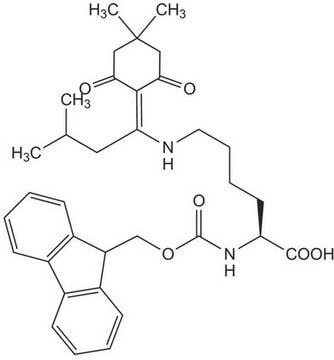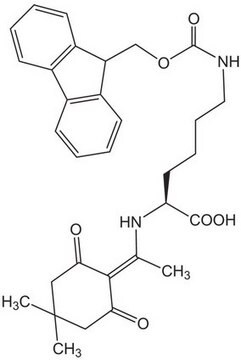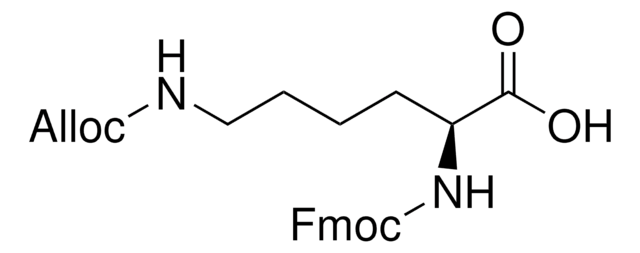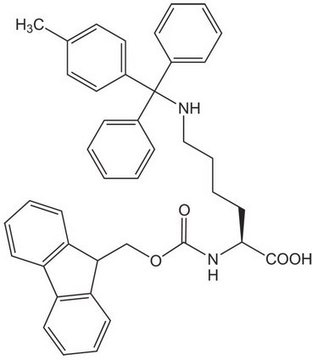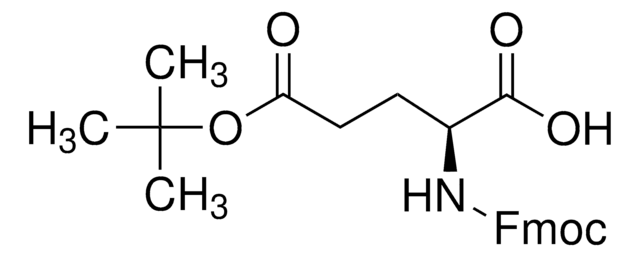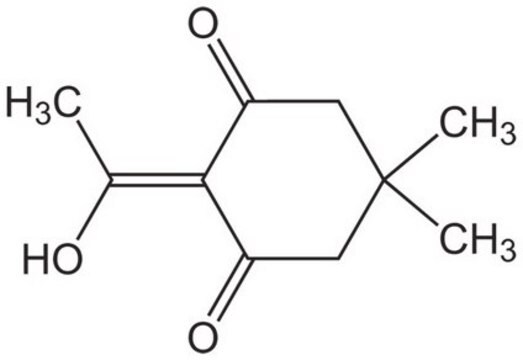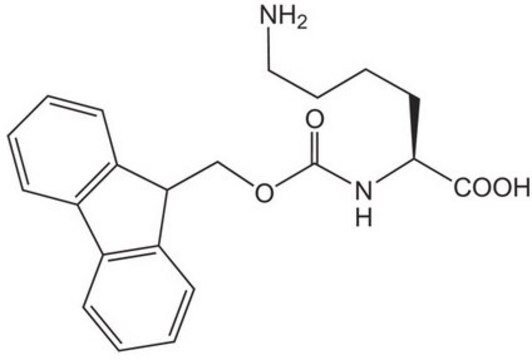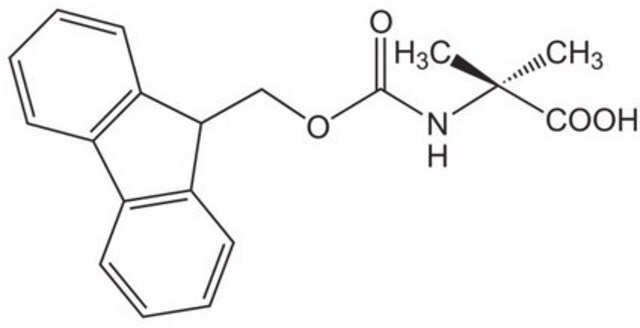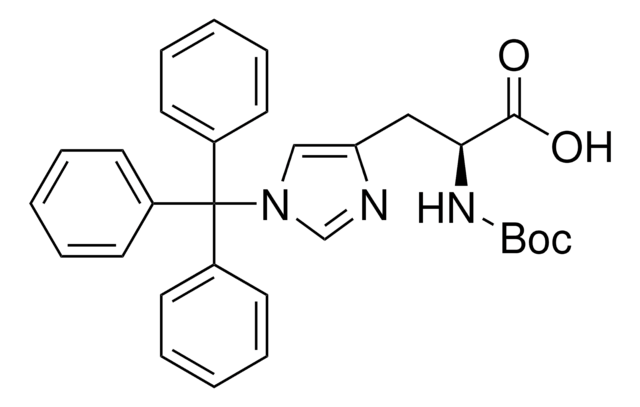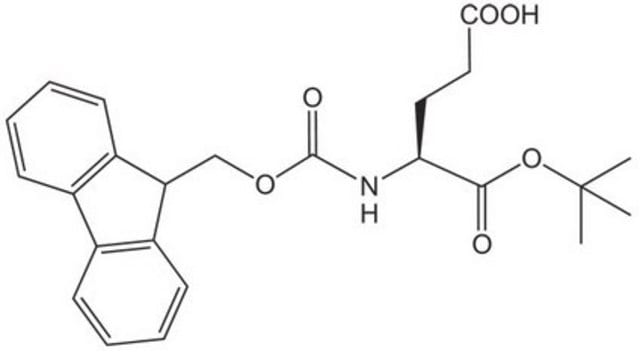おすすめの製品
product name
Fmoc-Lys(Dde)-OH, Novabiochem®
品質水準
製品種目
Novabiochem®
アッセイ
≥90.0% (acidimetric)
≥97.0% (HPLC)
≥98% (TLC)
形状
powder
反応適合性
reaction type: Fmoc solid-phase peptide synthesis
メーカー/製品名
Novabiochem®
mp
80 °C (decomposes)
アプリケーション
peptide synthesis
官能基
amine
保管温度
15-25°C
InChI
1S/C31H36N2O6/c1-19(28-26(34)16-31(2,3)17-27(28)35)32-15-9-8-14-25(29(36)37)33-30(38)39-18-24-22-12-6-4-10-20(22)21-11-5-7-13-23(21)24/h4-7,10-13,24-25,34H,8-9,14-18H2,1-3H3,(H,33,38)(H,36,37)/t25-/m0/s1
InChI Key
AOHSSQNORWQENF-VWLOTQADSA-N
詳細
Quasi-orthogonally-protected Lys derivative for Fmoc SPPS. The Fmoc group can be removed selectively by treatment with piperidine; the Dde group is cleaved with 2% hydrazine in DMF [1]. When removing Dde in the presence of allyl based protecting groups, allyl alcohol should be included in the deprotection solution to prevent reduction of the allyl group [2].Lys(Dde) has been employed in the following applications: synthesis of branched peptides [1] and di-epitopic peptides [3]; preparation of MAP core molecules and lipo-MAPs [4,5]; construction of cyclic peptides [6], TASP molecules [7], templates for combinatorial chemistry [8] and synthetic proteins [9]; preparation of peptides modified at the lysine side-chain [10,11,12,13,14].It has been reported that Dde can migrate from the side-chain of Lys to the unprotected side-chain of another Lys residue [15], and from the β-amino group to the α-amino group of Dpr [16]. In the former instance, this problem can be overcome by using Fmoc-Lys(ivDde)-OH (852082) or using DBU/DMF (2:98) for Fmoc group removal [15,17].Full orthogonality of Dde with Fmoc has recently been demonstrated when hydroxylamine is used for Dde removal [18].
Associated Protocols and Technical Articles
Cleavage and Deprotection Protocols for Fmoc SPPS
Literature references
[1] B. W. Bycroft, et al. (1993) J. Chem. Soc., Chem. Commun., 778.
[2] B. Rohwedder, et al. (1998) Tetrahedron Lett., 39, 1175.
[3] N. Ahlborg (1995) J. Immun. Meth., 179, 269.
[4] B. W. Bycroft, et al. in ′Peptides, Chemistry, Structure & Biology, Proc. 13th American peptide Symposium′, R. S. Hodges & J. A. Smith (Eds), ESCOM, Leiden, 1994, pp. 727.
[5] J. Mack, et al. (2001) J. Peptide Sci., 7, 338.
[6] G. B. Bloomberg, et al. (1993) Tetrahedron Lett., 34, 4709.
[7] P. Dumy, et al. (1995) Tetrahedron Lett., 36, 1255.
[8] J. Eichler, et al. (1994) Pept. Res., 7, 300.
[9] C. G. Fields, et al. (1993) Biopolymers, 33, 1695.
[10] H. F. Brugghe, et al. (1994) Int. J. Peptide Protein Res., 43, 166.
[11] P. Hoogerhout, et al. (1995) Infection & Immunity, 63, 3473.
[12] D. Lelievre, et al. (1995) Tetrahedron Lett., 36, 9317.
[13] P. Hoogerhout, et al. (1999) J. Peptide Res., 54, 436.
[14] P.J. Conolly, et al. (2000) Tetrahedron Lett., 41, 5187.
[15] K. Augustyns, et al. (1998) J. Peptide Res., 51, 127.
[16] A. Srinivasan, et al., Poster 111 presented at the 15th American Peptide Symposium, Nashville, 1997.
[17] S. Peluso, et al. (1999) J. Org. Chem., 64, 7114.
[18] J. J. Diaz-Mochón, et al. (2004) Org. Lett., 6, 1127.
Associated Protocols and Technical Articles
Cleavage and Deprotection Protocols for Fmoc SPPS
Literature references
[1] B. W. Bycroft, et al. (1993) J. Chem. Soc., Chem. Commun., 778.
[2] B. Rohwedder, et al. (1998) Tetrahedron Lett., 39, 1175.
[3] N. Ahlborg (1995) J. Immun. Meth., 179, 269.
[4] B. W. Bycroft, et al. in ′Peptides, Chemistry, Structure & Biology, Proc. 13th American peptide Symposium′, R. S. Hodges & J. A. Smith (Eds), ESCOM, Leiden, 1994, pp. 727.
[5] J. Mack, et al. (2001) J. Peptide Sci., 7, 338.
[6] G. B. Bloomberg, et al. (1993) Tetrahedron Lett., 34, 4709.
[7] P. Dumy, et al. (1995) Tetrahedron Lett., 36, 1255.
[8] J. Eichler, et al. (1994) Pept. Res., 7, 300.
[9] C. G. Fields, et al. (1993) Biopolymers, 33, 1695.
[10] H. F. Brugghe, et al. (1994) Int. J. Peptide Protein Res., 43, 166.
[11] P. Hoogerhout, et al. (1995) Infection & Immunity, 63, 3473.
[12] D. Lelievre, et al. (1995) Tetrahedron Lett., 36, 9317.
[13] P. Hoogerhout, et al. (1999) J. Peptide Res., 54, 436.
[14] P.J. Conolly, et al. (2000) Tetrahedron Lett., 41, 5187.
[15] K. Augustyns, et al. (1998) J. Peptide Res., 51, 127.
[16] A. Srinivasan, et al., Poster 111 presented at the 15th American Peptide Symposium, Nashville, 1997.
[17] S. Peluso, et al. (1999) J. Org. Chem., 64, 7114.
[18] J. J. Diaz-Mochón, et al. (2004) Org. Lett., 6, 1127.
関連事項
Replaces: 04-12-1121
アナリシスノート
Colour (visual): white to slight yellow to beige
Appearance of substance (visual): powder
Identity (IR): passes test
Enantiomeric purity: ≥ 99.5 % (a/a)
Purity (TLC(157B)): ≥ 98 %
Purity (TLC(CMA2)): ≥ 98 %
Assay (HPLC, area%): ≥ 97.0 % (a/a)
Solubility (1 mmole in 2 ml DMF): clearly soluble
Assay (acidimetric): ≥ 90.0 %
Water (K. F.): ≤ 1.0 %
To see the solvent systems used for TLC of Novabiochem® products please click here.
Appearance of substance (visual): powder
Identity (IR): passes test
Enantiomeric purity: ≥ 99.5 % (a/a)
Purity (TLC(157B)): ≥ 98 %
Purity (TLC(CMA2)): ≥ 98 %
Assay (HPLC, area%): ≥ 97.0 % (a/a)
Solubility (1 mmole in 2 ml DMF): clearly soluble
Assay (acidimetric): ≥ 90.0 %
Water (K. F.): ≤ 1.0 %
To see the solvent systems used for TLC of Novabiochem® products please click here.
法的情報
Novabiochem is a registered trademark of Merck KGaA, Darmstadt, Germany
保管分類コード
11 - Combustible Solids
WGK
WGK 2
引火点(°F)
Not applicable
引火点(℃)
Not applicable
試験成績書(COA)
製品のロット番号・バッチ番号を入力して、試験成績書(COA) を検索できます。ロット番号・バッチ番号は、製品ラベルに「Lot」または「Batch」に続いて記載されています。
この製品を見ている人はこちらもチェック
資料
Novabiochem® offers orthogonally protected amino acids for peptide synthesis, including cyclic and branched peptides.
ライフサイエンス、有機合成、材料科学、クロマトグラフィー、分析など、あらゆる分野の研究に経験のあるメンバーがおります。.
製品に関するお問い合わせはこちら(テクニカルサービス)